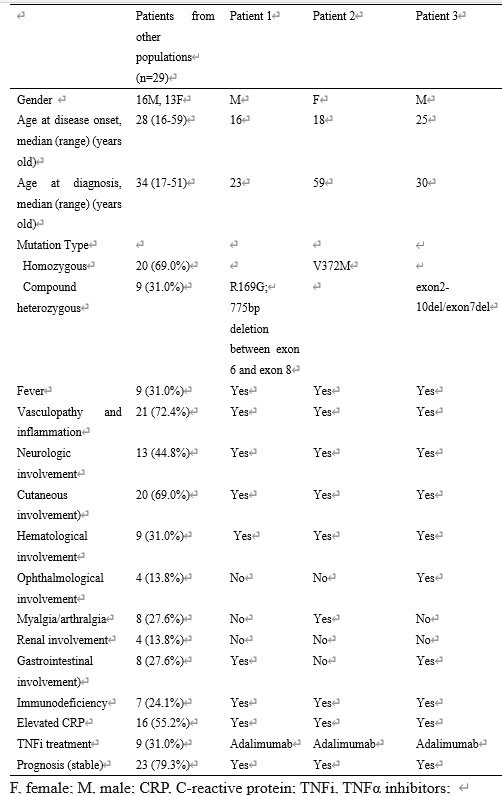Session Information
Session Type: Poster Session D
Session Time: 1:00PM-3:00PM
Background/Purpose: Deficiency of adenosine deaminase 2 (DADA2) is an autosomal recessive autoinflammatory disease, characterized by early‑onset vasculopathy, fever, strokes, livedoid rash, hepatosplenomegaly, and hematologic dysfunction, associated with mutations in the ADA2 gene, which was first described in 2014, DADA2 is usually reported in pediatric patients, with 77% before the age of 10 years. Adult-onset DADA2 patients have also been occasionally reported. However, DADA2 patients have been hardly reported in the Chinese population. We sought to identify the phenotype and genotype of adult-onset DADA2 patients.
Methods: We recorded the clinical data and genotype of three Chinese adult-onset DADA2 patients(≥16 years) were diagnosed and followed up in our tertiary medical center from 2015 to 2021. Whole-exome sequencing and adenosine deaminase 2 (ADA2) enzyme activity were performed in all patients. We also searched the case reports of Chinese childhood-onset DADA2 and adult-onset DADA2 from other populations. Their phenotypes and genotypes were further summarized and compared.
Results: Our patients had all main clinical manifestations of DADA2 including vasculopathy and inflammation, hematological disorder and immunodeficiency, and serum ADA2 levels were almost undetectable. Two patients had gastrointestinal involvement (Patient 1 and Patient 3), one patient had arthritis (Patient 2), and another one had ophthalmological abnormalities (Patient 3). The phenotypes of the Chinese adult-onset DADA2 patients were similar to those of pediatrics, while the occurrence of fever, immunodeficiency and hematological abnormalities was higher than that in adult-onset patients from other populations. Compared to adult-onset patients from other populations, our patients had a smaller disease-onset age (median: 18 years old vs. 28 years old), higher frequency of immunodeficiency (100% vs. 24.1%), hematological involvement (100% vs. 31.0%), and fever (100% vs. 31.0%). Two SNPs and three deletion variants in the ADA2 gene were identified in our patients. In patient 1, R169G and exon 7 deletion were found. In patient 2, V372M were detected. In patient 3, exon 7 deletion was identified. Two of our adult-onset patients and all nine childhood-onset patients had compound heterozygous for missense variants, In the 29 adult-onset DADA2 patients from other populations, the most common variants are homozygous variants, 20 out of 29 (69.0%) patients carried homozygous variants. Deletion of exon 7 was detected only in one patient.
Conclusion: In our study, adult-onset DADA2 patients had a broad range of phenotypes. Vasculopathy, inflammation, stroke were the most frequent symptoms. DADA2 is not only seen in young children, and adult providers need to be aware of this monogenic syndrome as well. DADA2 has a broad range of phenotypes, and other genetic and epigenetic modifications, the amount of remaining ADA2 activity, and environmental factors may influence the clinical phenotype of DADA2, and it makes the diagnosis a huge challenge. Early diagnosis through gene sequencing and ADA2 activity assay, followed by initiation of anti-TNF therapy, can significantly improve the prognosis of DADA2 patients.
To cite this abstract in AMA style:
Zu B, wang r, Wang X, Zhang B, Xu N, Huang C, Shen M, Zeng X. Phenotype and Genotype of Adult-onset Adenosine Deaminase 2 Deficiency Patients [abstract]. Arthritis Rheumatol. 2022; 74 (suppl 9). https://acrabstracts.org/abstract/phenotype-and-genotype-of-adult-onset-adenosine-deaminase-2-deficiency-patients/. Accessed .« Back to ACR Convergence 2022
ACR Meeting Abstracts - https://acrabstracts.org/abstract/phenotype-and-genotype-of-adult-onset-adenosine-deaminase-2-deficiency-patients/


